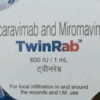- Your cart is empty
- Continue Shopping
Tybriva 140mg Capsule
Uses of Tybriva 140mg Capsule
Tybriva 140mg Capsule is used in the treatment of
- Mantle cell lymphoma
- Chronic lymphocytic leukemia (Blood cancer)
- Small lymphocytic lymphoma
- Waldenstrom’s macroglobulinemia
- Chronic graft vs. host disease after failure of systemic therapy
Introduction Of Tybriva 140mg Capsule
Tybriva 140mg Capsule consists of the active ingredient Ibrutinib. It is indicated to treat blood cancers such as mantle cell lymphoma (MCL), chronic lymphocytic leukemia (CLL), small lymphocytic lymphoma (CLL), Waldenstrom’s macroglobulinemia, and Marginal zone lymphoma (MZL). These are cancers of the white blood cells called lymphocytes that are part of the immune system. They differ from each other by the location where cancer occurs, type of lymphocytes affected, and certain other factors
Tybriva 140mg Capsule is also used to treat chronic graft versus host disease (cGvHD) after the failure of systemic therapy. During allogeneic stem cell transplantation, the patient receives stem cells from the donor. GvHD occurs when donor cells attack the patient’s cells as foreign. Before taking Tybriva 140mg Capsule, you need to talk with your physician if you have bleeding problems, infection, liver problems, heart problems, or intolerance to some sugars. This medication is not recommended for adolescents and children.
It is vital to let the physician know if you have recently had or are about to have any surgical procedure. Your physician may stop Tybriva 140mg Capsule for any planned surgical or medical procedure. Use effective birth control during the treatment and for at least one month after the final dose. Avoid having grapefruit or oranges in any form during this treatment; they may raise the amount of drug in the blood. Drink plenty of fluid to prevent dehydration. Inform your physician if you have diarrhea that does not go away.
Therapeutic Effects of Tybriva 140mg Capsule
The mechanism of action of Tybriva 140mg involves blocking a specific protein called Bruton’s tyrosine kinase (BTK) which plays a key role in the survival and growth of cancer cells. By inhibiting BTK, Tybriva 140mg prevents the cancer cells from receiving the signals they need to grow and divide, leading to their eventual death.
Interaction of Tybriva 140mg Capsule with other drugs
Inform your healthcare professional about all the medicines you take, including prescription medications, over-the-counter medications, nutritional and vitamin supplements, and herbal products. Certain medications interacting with Tybriva 140mg , may reduce effectiveness by causing undesirable side effects.
More Information about Tybriva 140mg Capsule
- Store the capsules in the original packaging at room temperature (20-25°C).
How to consume Tybriva 140mg Capsule
Consume this medicine at the same time each day. While taking Tybriva 140mg do not consume grapefruit or orange in any form during the treatment. Drink plenty of fluid to prevent dehydration.
Safety Advices for Tybriva 140mg Capsule
Pregnancy
Consult your doctor
This medicine can harm the unborn baby. Do not take Tybriva Capsule unless your physician instructs you to take it. Inform your physician before starting this treatment if you are pregnant or think you might be pregnant.
Breast Feeding
Consult your doctor
Do not breastfeed while you are under Tybriva capsule and for at least one week after the last dose. Consult your physician for risks and benefits.
Lungs
Consult your doctor
Tybriva capsule may cause interstitial lung disease. So if you have any respiratory disorder, inform your doctor before starting the treatment.
Liver
Consult your doctor
Inform your physician before starting this treatment if you have liver problems, including hepatitis B infection. Tybriva 140mg capsule could cause the reactivation of the hepatitis B virus, which makes the condition fatal.
Alcohol
Unsafe
It is unknown whether it is safe to consume alcohol with the Tybriva 140mg capsule. Please consult your doctor.
Driving
Consult your doctor
Tybriva 140mg capsule may cause dizziness or tiredness. Avoid driving or operating machines if you feel dizzy or tired.
Side Effects of Tybriva 140mg Capsule
Serious
- Bleeding problems
- Infections
- Decrease in blood cell counts
- Heart problems
- High BP
- Secondary cancer
- Tumor lysis syndrome
- Severe allergic reactions
Common
- Nausea, vomiting, diarrhea
- Tiredness
- Muscle and bone pain
- Rash and bruising
- Mouth sores
- Pneumonia
- Fever, chills
- Breathlessness
- Constipation
- Dizziness
- Body pain
- Swollen ankles and feet
- Increased creatinine levels in blood
- Heavier periods and blood in urine
- Blurred vision
- Weakness and numbness








Reviews
There are no reviews yet.